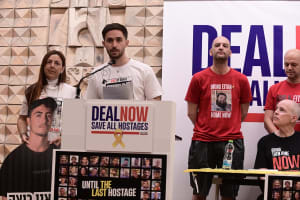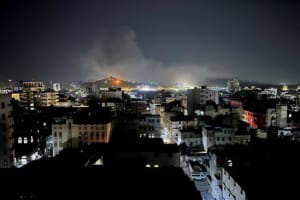Israeli military commander in charge of Be’eri Oct 7 battle apologizes for failure to prevent Hamas massacre of over 100 residents

IDF Brig.-Gen. Barak Hiram, the commander of the Israel Defense Forces 99th Division, who fought against invading Hamas terrorists at Kibbutz Be’eri in southern Israel on Oct. 7, met with the bereaved families of local residents who were murdered by the terrorist group. He apologized for the IDF’s failure to prevent one of the worst massacres in the history of the modern State of Israel.
Hamas terrorists massacred more than 100 local Israeli civilians on Kibbutz Be'eri, including women, elderly and children. In addition, dozens of Israeli security operatives died during what became one of the fiercest battles on Oct. 7.
The meeting between Hiram and Kibbutz Be'eri residents was reportedly tense due to the IDF general's controversial order to shell Hamas operatives who were hiding with 15 hostages in the home of the late resident Pessi Cohen during the attack on Oct. 7.
While one hostage managed to escape the building, 13 of the 14 remaining hostages were killed in the fire exchange between the terrorists and IDF troops following Hiram's orders.
Earlier in July, the IDF presented an initial investigation of the devastating Be’eri battle.
“The public is entitled to answers, and we must answer the most difficult and painful questions,” IDF Spokesman Brig.-Gen. Daniel Hagari pledged.
"Today, we presented the investigation of the battle in Be’eri,” said Hagari. “We present the investigations according to their level of readiness. This investigation is the beginning of a process,” he added.
The IDF’s initial probe concluded that many of the hostages were killed by gunfire and assessed that Hiram’s decision was “professional and reasonable.” However, local residents accuse the general of indirectly causing the death of a large number of Be'eri residents amid the battle with Hamas terrorists.
Hiram took full responsibility for the military operation at Be’eri and argued that Hamas terrorists “had come to murder everybody on the kibbutz.”
“It was hell even to get here [to Be’eri],” Hiram recalled. “The number of vehicles, the number of bodies on the way — this did not look like [the work of] people who came to leave anybody alive,” he added. The general said he was “very sorry, from the bottom of my heart, if any of my behavior in the 10 months [since October 7] personally hurt anybody.” “Nothing I said was intended, heaven forbid, to do harm or indicate contempt,” he told the bereaved families.
“He apologized for the very great loss that we all experienced inside the house,” said Cohen's daughter-in-law Sharon.
“As far as I’m concerned, he understands that the IDF failed,” she added, noting that the general had told the local residents he wanted to save lives.
“Barak said that all the IDF wanted to do was save lives…everything they did was to try and allow the hostages to leave the house alive, which to our sorrow, did not end up happening,” Cohen concluded.
Ron Shafroni, who lost several relatives in the Be’eri massacre, including the 12-year-old twins Liel and Yannai Hetzroni, emphasized that no dialogue or apologies would bring their beloved ones back to life.
“No dialogue, no matter how sincere it may be, will bring our loved ones back to us,” Shafroni stated.
Earlier in July, Amit Itiel-Hershkowitz visited Be’eri, where her murdered parents lived, for the first time since the Oct. 7 brutal Hamas terror attack.
"I think people in Be'eri want and are looking for closure, but for me, there will be no closure. My parents are gone. I also don't think one can judge the soldiers who came there and fought. No one thought at the time that it was an event of such magnitude," Itiel-Hershkowitz said.

The All Israel News Staff is a team of journalists in Israel.














